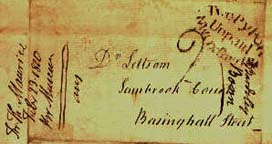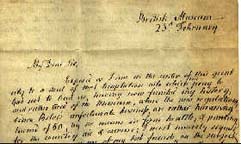These letters graciously have been shared with the Victorian Web by Eunice and Ron Shanahan from their website, Letters from the Past.
Postal Marks

This 'Letter from the Past' is a London Two Penny Post letter of 1810. The postal markings are
- a black Unpaid, undated stamp of the Receiving Office NW Oxford St. In George Brumell's book, The Local Posts of London 1680-1840, the NW Oxford St Receiving House does not appear in the Town Lists of Receiving Houses of the Penny Post and Twopenny Post, but he notes that it is recorded on letters up to about 1816, and is thought to be the same one as Oxford St WO
- a black charge mark '2' showing the amount to be collected on delivery.
The 2d charge was introduced in the Act of 1805, for all letters in the Two Penny Post area, whether for delivery in the Town or country areas in London, or if in transit to or from the General Post. At this time, there were six deliveries a day in the Town area, and letters for the first delivery, (between 7.30am and 900am) could be handed in at a Receiving House up to eight o'clock the night before.
The Letter

The letter was addressed to Dr Lettsam, Sambrook court, Basinghall Street, London. This was probably John Coakley Lettsam (1744-1815) a Quaker physician and philanthropist, a Fellow of the Society of Antiquaries and a Fellow of the Royal Society. It was written by Reverend Thomas Maurice (1754-1824) who was appointed Assistant Librarian at the British Museum in London in 1799. He was a noted oriental scholar and historian, who had produced both his six-volume work Indian Antiquities and his History of Hindostan during the 1790s.
British Museum, 23rd February
My Dear Sir,
Exposed as I am in the center of this great city to a deal of that temptation into which we pray to God not to lead us, having now finished my history and rather tired of the Museum, where the new regulations since Beloe's unfortunate business,1 are rather harassing — turned of 50, by no means in firm health, and panting for the country air and exercise: I most sincerely request your opinion, as one of my best friends, on the subject of my friend Nares's kind letter to me herewith inclosed, as likewise what sum I ought to ask.'
The salary is 120£ a year with very good apartments, worth 60£ a year at least; with certain privileges, to a literary man very valuable, besides the chance of the Gentleman's rising to places of double and treble my salary if he chuses to be assiduous. I think I ought to ask 1500£ which I might sink in the Govemment annuities for about the value of my salary.
I should then retire to Bromley, in Kent, near my living where there is a respectable society and two or three clergyman whom I well know, and also the good bishop. Nares,3 I think, would hardly have mentioned this, were not the thing feasible, & I believe, between ourselves, the Trustees knowing me not to be much cut out to be a librarian, would be glad to have a younger & more active person in my room. I have written to Nares that I would take a week's time to consider of the thing, and then send him my answer.
Will my dear friend, Dr Lettsam, turn the matter in his mind for me, and let me know his opinion upon it, & possibly, should it take effect, he may put me in the way of getting a better annuity for such a battered constitution as mine, than Government may allow at 53!
With between 4 & 500£ a year, when I have obtained a final discharge from Mr Hammersley's hands, I might with prudence, live very comfortably near Cudham, for there is no house upon the living, and I could take a little additional duty to increase income, & employ vacant days."
The letter then continues with a paragraph about which I can find little information, except that the King referred to is King George III, who suffered bouts of insanity, which developed to such an extent that finally his son was appointed Prince Regent, until his father's death in 1820. Burke was probably Edmund Burke (1729-97) the statesman and philosopher, but the contents of the letter, and 'Pickering', or why it could have ended up with Dr Lettsam, has to remain a tantalising mystery.
I once gave to poor Pickering a letter of the utmost value & importance, written by Burke to me, about the time of the King's insanity. He wished to have it & I gave it to him, as I would have anything else in my power to give him. If it should have fallen into your hands, or you could recover it for me, you would infinitely oblige me, and a man of no small rank & worth, his relation.
I keep as steadily as I can to my good resolutions, and am every, dear Sir, your much obliged and faithful friend.
Tho. Maurice"
P.S. Dr Willan, who is very obliging to me, and very much likes my Indian Antiquities, sits by me in the Reading Room, immersed in the Arabian writers on cutaneous complaints."
The outside of the letter is marked "ansd" and the reply given by Dr Lettsam was apparently such that Maurice did not resign in 1810 but soon after was promoted to the position of Assistant Keeper of Manuscripts. Possibly he was contemplating an early retirement with a handsome gratuity but was dissuaded either by Dr Lettsam or the Museum's Trustees. He remained at the Museum until his death on March 30, 1824.
Before his death, between 1819 and 1822 he had written his own memoir in three parts. However, that his work was not universally admired, is shown by this extract of a somewhat patronising comment which was printed in The Times, in November 1825:
Mr Maurice, the other attendant in the Reading Room, ... is gone the way of all flesh. He was a poet and historian, on whom not his own works, but Lord Byron's satire, confessed immortality. Poor Maurice was latterly, for some years, good for nothing, and did nothing. What he was at anytime good for is not recorded for the benefit of posterity.
3 December 2002